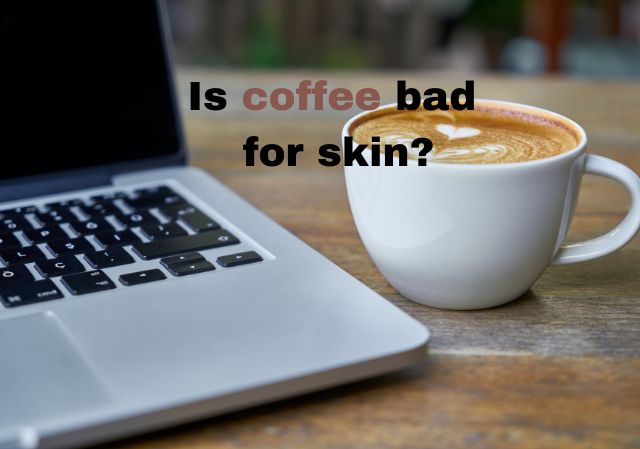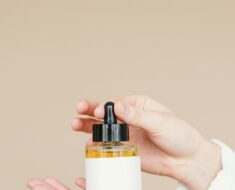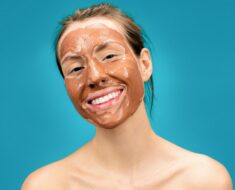Are you a coffee addict who can’t start your day without a cup of coffee? Do you ever wonder if your love for coffee is bad for your skin? Well, we have the answer for you.
Drinking too much coffee can be harmful to your skin. In short, caffeine is dehydrating, and dehydration can lead to dry, dull, and flaky skin.
Caffeine also increases cortisol levels in the body, which can lead to increased oil production and acne breakouts.
However, moderation is key, and enjoying your morning cup of coffee in moderation shouldn’t harm your skin.

So, is it time to ditch your coffee addiction for the sake of your skin? Before you do that, let’s explore the impact of coffee on the skin in more detail.
So, without further ado, let’s delve into the world of coffee and skincare.
The Effects of Caffeine on Your Skin
Caffeine is a natural stimulant that can provide several benefits to the body, including increased energy and mental alertness. However, caffeine can also have some negative effects on the skin.
While caffeine can provide a much-needed energy boost, it can also have an impact on skin health. Now, we will discuss the various ways in which caffeine affects your skin.
1. Coffee and Dehydration
One of the main effects of caffeine on the skin is that it can cause dehydration. This is because Coffee is a diuretic, which means that it can increase the amount of urine produced by the body.
This can lead to dehydration, which can have a negative effect on the skin. Dehydration can cause the skin to become dry, itchy, and flaky, and can also lead to the formation of wrinkles.
2. Coffee and Inflammation
Another effect of drinking too much coffee is that it can cause inflammation in the body. Inflammation can lead to a variety of health problems, including skin issues.
When the body is inflamed, it can produce more free radicals, which can damage the skin and cause it to age prematurely.
3. Coffee and Aging
Coffee can also have an impact on the aging process. When the skin is exposed to free radicals, it can cause damage to the collagen and elastin fibers in the skin, which can lead to wrinkles and fine lines.
Additionally, caffeine can increase cortisol levels in the body, which can also contribute to aging and excessive caffeine consumption may interfere with sleep, which can also impact the aging process.
4. Coffee and Acne
One of the most common skin issues that people face is acne. While coffee may not directly cause acne, it can worsen existing acne. This is because coffee can increase cortisol levels in the body, which can lead to an increase in sebum production.
Sebum is the oil that is produced by the sebaceous glands in the skin, and when there is an excess of it, it can lead to acne breakouts.
5. Coffee and Cortisol levels
Caffeine can increase cortisol levels in the body, which can have a negative effect on the skin. Cortisol is a hormone that is produced by the adrenal gland, and it plays a role in the body’s stress response.
When cortisol levels are elevated, it can lead to an increase in oil production in the skin. This can cause the skin to become oily, which can lead to acne breakouts.
Should You Ditch Your Morning Coffee?
Coffee is a beloved morning ritual for many people around the world, but lately, there has been much debate on whether or not this beloved beverage is actually good for you.
Some studies have suggested that too much coffee can lead to health problems, including issues with your skin.

So, should you ditch your morning coffee? The answer is not as simple as yes or no. While drinking too much coffee can cause dehydration, which can have negative effects on your skin, moderate coffee consumption can provide numerous health benefits, including increased mental alertness and improved physical performance.
Furthermore, coffee contains antioxidants that can help protect your skin from damage caused by free radicals, which can lead to premature aging. Coffee also has anti-inflammatory properties that can reduce skin redness and puffiness.
It is also important to remember that additives like sugar and cream can negate some of the health benefits of coffee, so it is best to consume it black or with a non-dairy milk substitute.
To sum up, if you enjoy your morning coffee, there’s no need to ditch it altogether. However, it is important to consume it in moderation and pay attention to how your body responds.
If you notice negative effects on your skin or other health issues, consider cutting back or eliminating coffee from your diet. As with any food or beverage, balance, and moderation are key to a healthy lifestyle.
As your doubts have cleared about is drinking too much coffee bad for skin?
So, now we should take a look at how much coffee is too much.
How Much Coffee Is Too Much?
If you’re a coffee lover, you may be wondering how much coffee is too much. While moderate coffee intake has been linked to several health benefits, including improved mental alertness and physical performance, excessive coffee consumption can have negative effects on your health.
According to the Dietary Guidelines for Americans, moderate coffee intake is defined as three to five cups per day or up to 400 milligrams of caffeine per day.
However, individual tolerance to caffeine can vary, and some people may experience negative effects from even moderate amounts of coffee.
Excessive coffee intake can lead to issues such as anxiety, insomnia, and digestive problems. Additionally, drinking coffee late in the day can disrupt your sleep patterns and affect your overall quality of sleep.
If you’re experiencing negative effects from coffee consumption or are unsure about your caffeine tolerance, it may be best to consult with a healthcare professional.
Alternatives to Coffee
If you’re looking to cut back on your coffee consumption or switch to a caffeine-free alternative, there are several options available to you. Here are some popular alternatives to coffee:
- Tea: Tea is a great alternative to coffee and comes in many different varieties, each with its own unique flavor and health benefits. Green tea, for example, is rich in antioxidants and has been linked to several health benefits, including improved brain function and a reduced risk of heart disease.
- Herbal tea: Herbal teas, such as chamomile, peppermint, and ginger, are also popular alternatives to coffee. These teas are naturally caffeine-free and can have a calming effect on the body, making them a great choice for those looking to reduce their caffeine intake.
- Matcha: Matcha is a type of green tea that is made by grinding green tea leaves into a fine powder. It is high in antioxidants and can provide a sustained energy boost without the crash that can come with coffee.
- Decaf coffee: If you still enjoy the taste of coffee but want to reduce your caffeine intake, decaf coffee is an option. It contains a small amount of caffeine but significantly less than regular coffee.
- Water: While not a direct replacement for coffee, drinking water throughout the day can help to keep you hydrated and alert. Dehydration can lead to fatigue and decreased cognitive function, so it’s important to stay hydrated throughout the day.

In conclusion, there are several alternatives to coffee available, each with its own unique benefits. Whether you’re looking to cut back on caffeine or simply want to try something new, there are plenty of options to choose from.
Frequently Asked Questions:
Can coffee cause skin problems?
While drinking coffee in moderation is generally safe for most people, consuming too much caffeine may lead to skin problems. Excessive caffeine intake can cause dehydration, which can lead to dry, itchy, and flaky skin.
Additionally, caffeine can stimulate the production of stress hormones, which may increase oil production and lead to breakouts.
Is drinking coffee good for the skin?
Moderate coffee consumption may have some benefits for the skin. Coffee contains antioxidants, which can help protect the skin from free radical damage and aging.
Additionally, the caffeine in coffee can constrict blood vessels and reduce inflammation, temporarily reducing the appearance of dark circles and puffiness under the eyes.
Does caffeine affect your skin?
Yes, caffeine can affect the skin in several ways. As mentioned earlier, caffeine can dehydrate the skin, leading to dryness and flakiness.
Additionally, caffeine can increase oil production and cause breakouts, especially in people with acne-prone skin. However, when consumed in moderation, caffeine may have some skin benefits, such as reducing inflammation and protecting against aging.
What are the side effects of drinking coffee every day?
While moderate coffee consumption is generally safe for most people, drinking too much coffee can have negative side effects.
Excessive caffeine intake can cause restlessness, anxiety, and insomnia, as well as digestive issues such as acid reflux and diarrhea. It can also lead to dehydration, which can cause headaches, dizziness, and dry skin.
It’s important to monitor your coffee intake and limit it to a moderate amount to avoid these side effects.
Conclusion
In conclusion, drinking too much coffee can have negative effects on your skin. It can dehydrate your skin, leading to fine lines and wrinkles, and also exacerbate conditions like acne and rosacea.
While it may be tempting to indulge in multiple cups of coffee a day, it’s important to consider the impact on your skin and overall health. However, it’s not necessary to completely ditch coffee altogether.
Moderation is key, and limiting your intake to 1-2 cups a day can help minimize any adverse effects on your skin.
Additionally, there are plenty of alternatives to coffee, such as herbal teas or caffeine-free drinks, that can provide a similar energy boost without the negative effects on your skin.
In summary, is drinking too much coffee bad for your skin? Yes, but with moderation and alternatives, you can still enjoy your daily cup of Joe without sacrificing your skin health.






